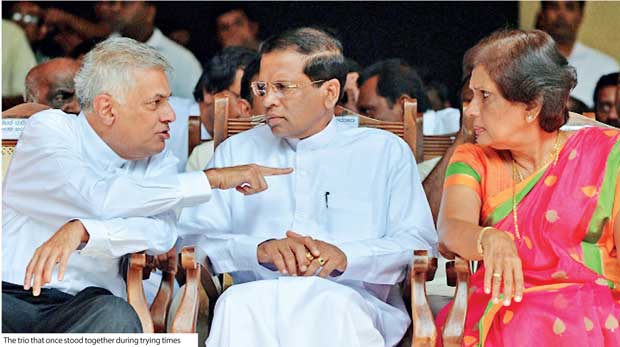20 Feb 2018 - {{hitsCtrl.values.hits}}

 The impact of the local government elections on the political system has been unbelievable and decisive. According to newspapers, President Maithripala Sirisena has asked Prime Minister Ranil Wickremesinghe to step down after the local elections debacle. However, a majority in the United National Party (UNP) wants Wickremesinghe to continue and is supportive of his leadership.
The impact of the local government elections on the political system has been unbelievable and decisive. According to newspapers, President Maithripala Sirisena has asked Prime Minister Ranil Wickremesinghe to step down after the local elections debacle. However, a majority in the United National Party (UNP) wants Wickremesinghe to continue and is supportive of his leadership.
The prime minister will now be required to demonstrated his support. The power struggle is further amplified on a private television, turning the issue into a media circus. The fact is the president cannot remove the prime minister. The 19th Amendment to the constitution places certain restrictions.
According to legal experts, the 19th Amendment has severely restricted the executive president’s options. The appointment of a political committee to decide on the future course of the national government appears to be a face-saving mechanism for all concerned. However, changing the status quo and how the government is run is now an absolute necessity to make any decisive impact on the electorate in the future, given that the provincial council elections have to be held during the year.
Right royal debacle
Despite all the arguments that the unity government’s main two partners – the United National Party (UNP) and Sri Lanka Freedom Party (SLFP) obtained 1.5 percent more than Sri Lanka Podujana Peramuna (SLPP) (SLPP 44.66 percent - 4.941 million, 46.01 percent 5.093 million) and the other two partners (Janatha Vimukthi Peramuna (JVP) and Tamil National Alliance (TNA)) put together got 54 percent, it was a resounding victory for the SLPP, a newly formed party, with no state power of any sort.
Effectively, the SLPP had won 239 authorities as opposed to 41 by the UNP and 10 by the SLFP. Though it is now said that over 100 councils can and will be jointly be run by the national unity government, what is clearly evident now is that the government in the last two years lacked the political acumen to stay one step ahead of the joint opposition.
Often the strategy and tactics of the government were half baked. The government, as a result, gave the joint opposition an opportunity to go beyond the local issues and focus on the government’s performance on national issues. The top three are the rising cost of living, corruption involving some ministers and certain officials in committee and limited infrastructure development.
The other issue that the government did not address is the criticism that the administration was slowing the investigations into the high-profile cases and the mismanagement of the law and order apparatus as well as the Attorney General’s Department.
the talk of the SLFP moving out from the unity government will certainly signal the end of the January 8 mandate and the beginning of a new political chapter
Administration failures
The government failed to effectively deal with the issues impacting public services and got bogged down in the past three years in them. The inability to deal with trade unions in transport, health and energy sectors, including the gasoline crisis, the frequent protests and strikes affecting the life of the public, failure to provide jobs to supporters, failure to take decisive action against those accused of fraud in the Central Bank bond sales and sidelining party stalwarts by giving more powers to parachuters affected.
Not taking action against SriLankan Airlines board responsible for compounding losses and also incompetence in communicating the good the government had accomplished, effectively led to the UNP losing 10 percent of its voter base from the last election and the SLFP collecting less than 15 percent, the lowest in the history of the SLFP.
Therefore, Sirisena cannot only blame the UNP for the vote debacle, despite a media institution repeatedly blaming the prime minister. On the other hand, the public should not forget that the country last year was plagued with several natural disasters that devastated the lives of many people. Given the legacy of the debt build, it was a huge burden on a cash-trapped economy.
Way forward
Certainly all is not lost for both parties. In the next 24 months, the government needs to lead with a clear economic vision for the country and continue to steadfastly work towards ethnic unity and reconciliation. Given our huge debt situation, the prime minister’s international appeal as a market-friendly and liberal leader in the absence of an experienced, mature person is a must.
The president therefore must support him to implement a common economic programme so that they both have an opportunity to go before the people with a less cluttered and confused track-record. Also both leaders need to listen to the demands of their disgruntled voters and address their issues.
The UNP has 106 seats in parliament, seven short of the 113 required to enjoy an absolute majority. The party has enough numbers to form a minority government and implement policies more effectively. The fact that the prime minister is still determined to continue with the unity government with major changes of portfolios and strategies is a good sign and the best option for the country at this moment of time.
However, the talk of the SLFP moving out from the unity government will certainly signal the end of the January 8 mandate and the beginning of a new political chapter.
(Dinesh Weerakkody is a thought leader)
10 Jan 2025 1 hours ago
10 Jan 2025 1 hours ago
10 Jan 2025 3 hours ago
10 Jan 2025 3 hours ago
10 Jan 2025 3 hours ago